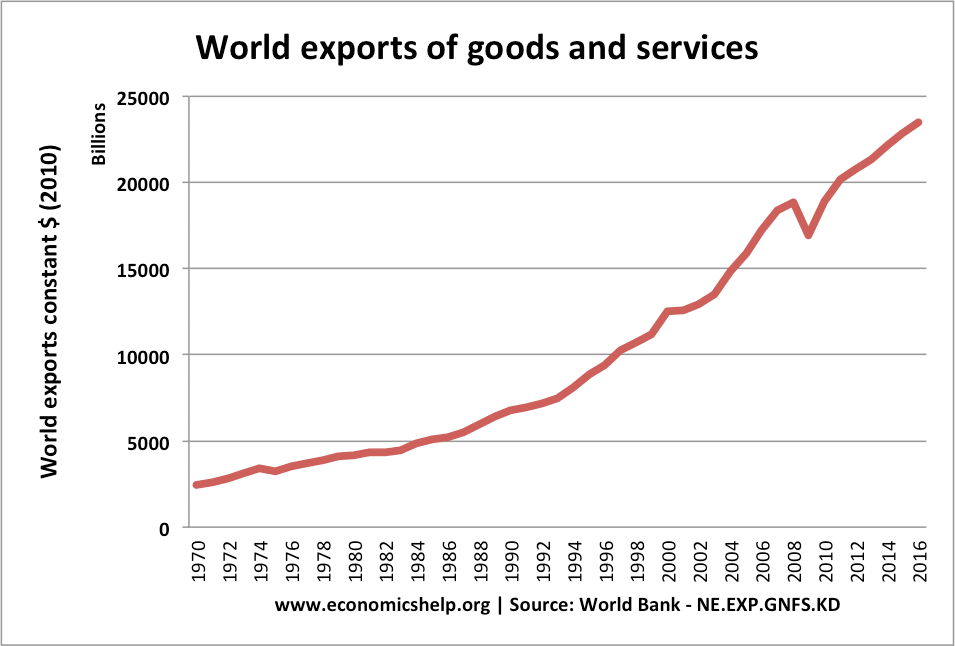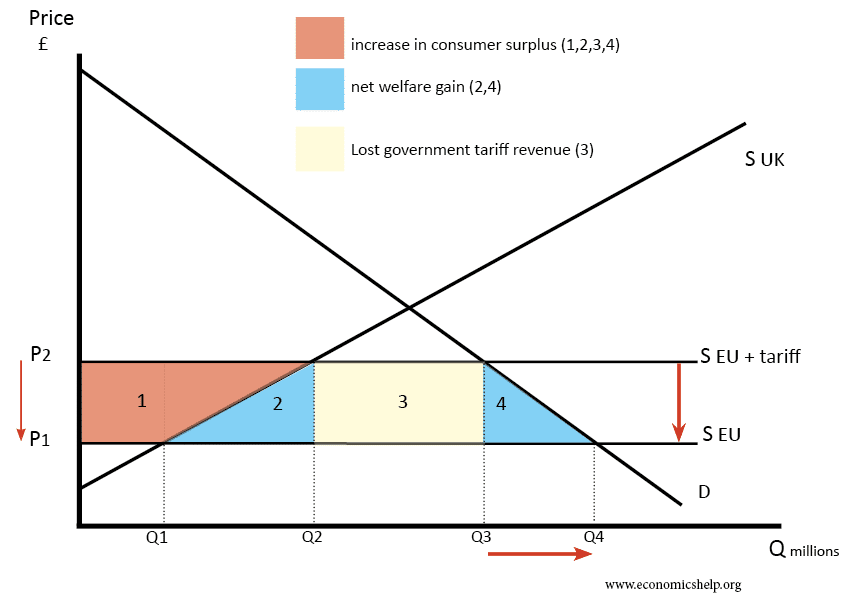Benefits of free trade
Free trade means that countries can import and export goods without any tariff barriers or other non-tariff barriers to trade.
Essentially, free trade enables lower prices for consumers, increased exports, benefits from economies of scale and a greater choice of goods.
In more detail, the benefits of free trade include:
1. The theory of comparative advantage
This explains that by specialising in goods where countries have a lower opportunity cost, there can be an increase in economic welfare for all countries. Free trade enables countries to specialise in those goods where they have a comparative advantage.
2. Reducing tariff barriers leads to trade creation
Trade creation occurs when consumption switches from high-cost producers to low-cost producers.
- The removal of tariffs leads to lower prices for consumers (Prices fall from P1 to P2)
- This fall in prices enables an increase in consumer surplus of areas 1 + 2 + 3 + 4
- Imports will increase from Q3-Q2 to Q4-Q1
- The government will lose tax revenue of area 3. Tax revenue from imports was T (P1-P2) × (Q3-Q2)
- Domestic firms producing this good will sell less and lose producer surplus equal to area 1
- However, overall there will be an increase in economic welfare of 2+4 (1+2+3+4 – (1+3)
- The magnitude of this increase depends upon the elasticity of supply and demand. If demand elastic consumers will have a big increase in welfare
- Essentially, removing tariffs leads to lower prices for consumers – so the price of imported food, clothes and computers will be lower. When the UK joined the EEC – the price of many imports from Europe fell.
3. Increased exports
As well as benefits for consumers importing goods, firms exporting goods where the UK has a comparative advantage will also see a significant improvement in economic welfare. Lower tariffs on UK exports will enable a higher quantity of exports boosting UK jobs and economic growth.
4. Economies of scale
If countries can specialise in certain goods they can benefit from economies of scale and lower average costs; this is especially true in industries with high fixed costs or that require high levels of investment. The benefits of economies of scale will ultimately lead to lower prices for consumers and greater efficiency for exporting firms.
5. Increased competition
With more trade, domestic firms will face more competition from abroad. Therefore, there will be more incentives to cut costs and increase efficiency. It may prevent domestic monopolies from charging too high prices.
6. Trade is an engine of growth.
World trade has increased by an average of 7% since 1945, causing this to be one of the significant contributors to economic growth.

7. Make use of surplus raw materials
Middle Eastern countries such as Qatar are very rich in reserves of oil, but without trade, there would be not much benefit in having so much oil.
Japan, on the other hand, has very few raw materials; without trade, it would have low GDP.
8. Tariffs may encourage inefficiency
If an economy protects its domestic industry by increasing tariffs industries may not have any incentives to cut costs.
Arguments against free trade
Many economists support free trade. However, in some circumstances, there are arguments in favour of trade restrictions. These include when developing economies need to develop infant industries and develop their economy.
Reasons for blocking free trade
- Infant industry argument
If developing countries have industries that are relatively new, then at the moment these industries would struggle against international competition. However, if they invested in the industry then in the future they may be able to gain comparative advantage.
- This shows that comparative advantage can change over time.
- Protection would allow developing industries to progress and gain experience to enable them to be able to compete in the future.
- More on infant industry argument
- The Senile industry argument
If industries are declining and inefficient they may require significant investment to make them efficient again. Protection for these industries would act as an incentive to for firms to invest and reinvent themselves. However, protectionism could also be an excuse for protecting inefficient firms
- To diversify the economy
Many developing countries rely on producing primary products in which
they currently have a comparative advantage. However, relying on agricultural products has several disadvantages
- Prices can fluctuate due to environmental/weather factors
- Goods have a low-income elasticity of demand. Therefore with economic growth demand will only increase a little.
- Raise revenue for the government.
Import taxes can be used to raise money for the government – however, this will only be a relatively small amount of money
- Help the Balance of Payments
Reducing imports can help the current account as it restricts imports. However, in the long-term, this is likely to lead to retaliation and also cause lower exports so it might soon prove counter-productive.
- Cultural Identity
This is not really an economic argument but more political and cultural. Many countries wish to protect their countries from what they see as an Americanisation or commercialisation of their countries
- Protection against dumping
Dumping occurs when a country has excess stock and so it sells below cost on global markets causing other producers to become unprofitable. The EU sold a lot of its food surplus from the CAP at very low prices on the world market; this caused problems for world farmers because they saw a big fall in their market prices. Other examples include allegations that China has been dumping excess supply of steel on global markets causing other firms to go out of business.
- Environmental
It is argued that free trade can harm the environment because LDC may use up natural reserves of raw materials to export. Also, countries with strict pollution controls may find consumers import the goods from other countries where legislation is lax and pollution allowed.

Comments
Post a Comment